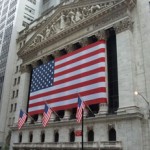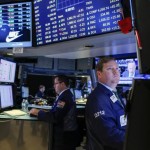IPO Wars: New York Stock Exchange Is Going Global

Apparently, the world’s biggest stock exchange isn’t big enough. The New York Stock Exchange – the symbol of American capitalism that boasts a market cap of around $21 trillion[1] – is ramping up efforts to attract more foreign companies to the Big Board. But the NYSE isn’t the only stock exchange looking to land more big-name IPOs. Exchanges in Asia and Europe are also narrowing in on prestigious firms looking to go public.
The Alibaba effect
Alibaba’s record-setting $25 billion initial public offering last year set the stage for what the media is calling a global IPO war. In addition to the sheer size of the initial valuation, the Alibaba IPO was significant for one other reason: it was listed on the NYSE and not the Hong Kong Stock Exchange. Despite efforts to attract the China-based global e-commerce giant, Hong Kong’s inability to accommodate Alibaba has been viewed as a major loss for the Special Administrative Region. The blow was so devastating that it has prompted Hong Kong to reconsider market regulations to ensure that another top-tier company doesn’t slip through its fingers.[2]
Cross-border IPO wars heating up
“With an increasingly sophisticated capital markets infrastructure in several emerging markets, there are more opportunities for issuers to raise capital beyond traditional listing centres such as London and New York.” – PricewaterhouseCoopers (2012)
According to PwC, cross-border IPO activity accounted for 9% of the volume and 14% of the value of all IPOs between 2002 and 2011. As one would expect, Chinese companies drove the activity, accounting for 30% of all cross-border IPOs. London and New York remained the most international exchanges, with 41% of all cross-border IPOs taking place in London compared with 23% in New York.[3]
According to Bloomberg, cross-border listings on the NYSE more than doubled between 2012 and 2014. The increase was even more dramatic on the Nasdaq, which saw its cross-border listings overtake the NYSE over the same period. Of the major exchanges, the Hong Kong Stock Exchange has the biggest number of cross-border listings at 60.[4]
In 2014, more than 150 foreign companies debuted on the major exchanges in New York, London, Hong Kong and Frankfurt. Together, they raised approximately $67 billion. That’s a huge increase over 2012, when roughly 70 IPs raised around $14 billion.[5]
Listings provide recurring income
One of the main factors behind the global push to land IPOs is maximizing listing revenue. Both the NYSE and Nasdaq exchanges have increased the recurring fees they charge companies listed on their exchanges. The NYSE saw its revenue from listings rise 12% in the second quarter, four times the increase of its trading business. Nasdaq is witnessing a similar trend.
According to Bloomberg, the four exchanges with the biggest share of foreign IPOs – NYSE, Nasdaq, London Stock Exchange and Hong Kong Stock Exchange – earn up to 20% of their total income from listing fees.[6]
Deeper markets will continue to attract foreign companies to New York
The major listings of New York and London have a competitive advantage in attracting foreign IPOs. As globalization intensifies, emerging market firms have plenty of reasons to opt for the deeper pockets of North America and Western Europe. IPOs can often raise more money and attract more investors in New York, given the depth of the equity markets there. This is especially the case for Chinese companies, which are facing greater regulatory oversight in the aftermath of the stock market crash earlier this year. The People’s Bank of China introduced tighter trading rules this summer that directly impact the country’s stock and foreign exchange markets. According to skeptics, the extent of the reforms highlight China’s inability to handle financial instability.[7]
Chinese companies are at greatest risk of being poached by the NYSE and other Western exchanges. Since 2012, mainland companies have represented the majority of foreign IPOs for the NYSE and Nasdaq.
“It’s increased competition, but it’s also increased opportunity,” says Amar Budarapu of law firm Baker & McKenzie, as quoted by Bloomberg. “You can go into other jurisdictions and say, ‘You should list on my exchange.’”
Nasdaq senior vice president Bob McCooey expects poaching to be part of US market listings for decades to come, signaling that the IPO wars are just getting started.[8]
[1] Andy Kiersz (November 18, 2014). “The NYSE Makes Stock Exchanges Around The World Look Tiny.” Business Insider.
[2] Kelvin Chan (September 15, 2014). “Hong Kong reconsiders market rules after losing huge Alibaba IPO to New York.” CTV News.
[3] PricewaterhouseCoopers (November 2012). ‘Equity sans frontieres’ Trends in cross-border IPOs and an outlook for the future.
[4] Annie Massa and Sam Mamudi (October 26, 2015). “Stock Exchanges Are Fighting a Global War for Listings.” Bloomberg Business.
[5] Annie Massa and Sam Mamudi (October 26, 2015). “Stock Exchanges Are Fighting a Global War for Listings.” Bloomberg Business
[6] Annie Massa and Sam Mamudi (October 26, 2015). “Stock Exchanges Are Fighting a Global War for Listings.” Bloomberg Business.
[7] Reuters (September 2, 2015). “China tightens trading rules on forex, stock markets.” Reuters.
[8] Annie Massa and Sam Mamudi (October 26, 2015). “Stock Exchanges Are Fighting a Global War for Listings.” Bloomberg Business.
Find more: Contributing Authors





























